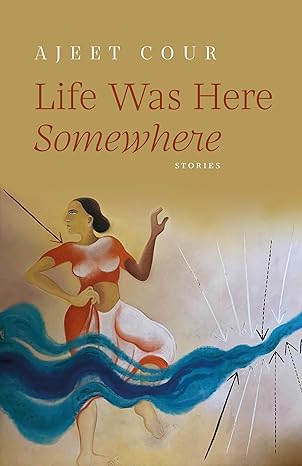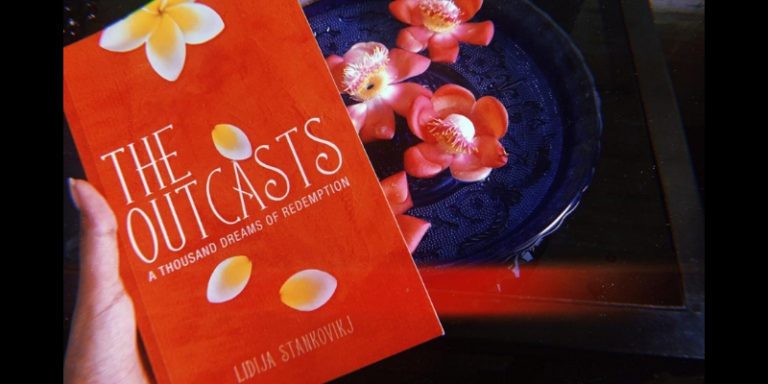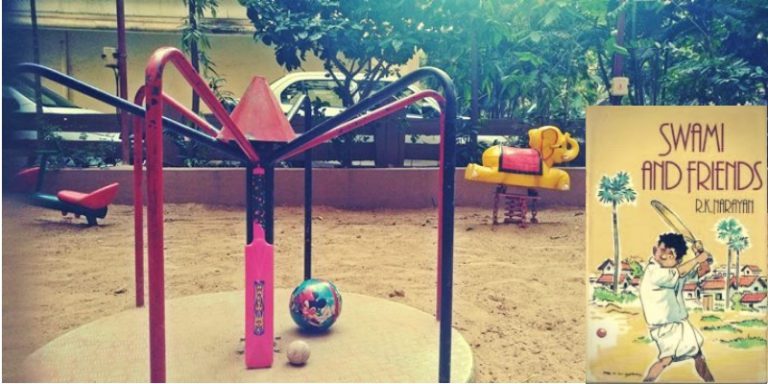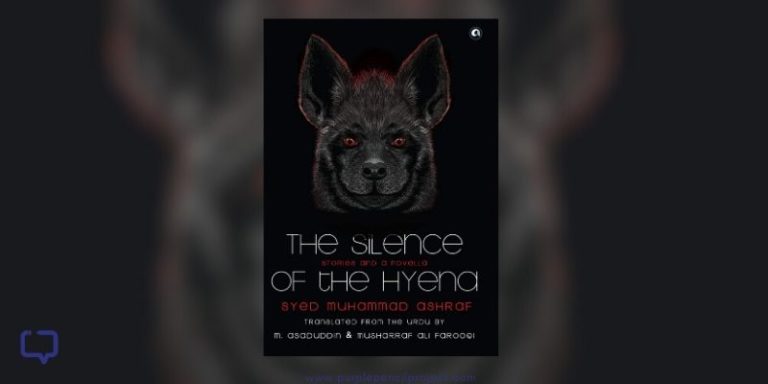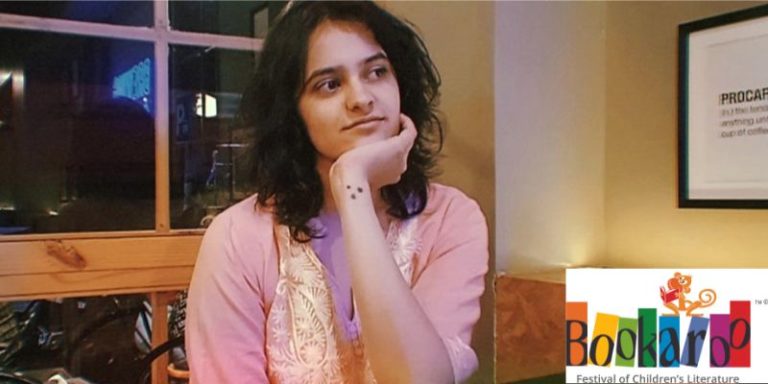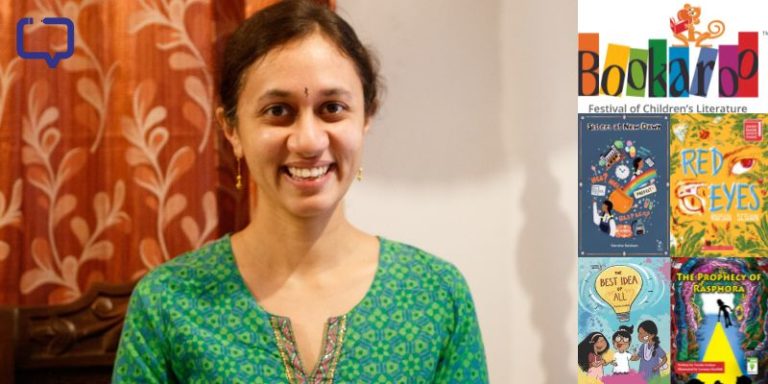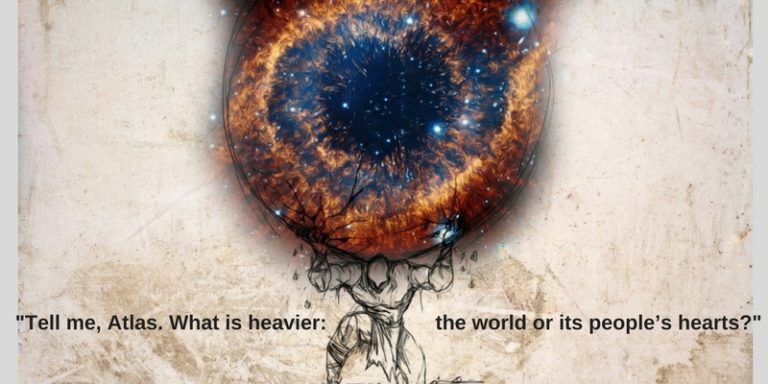Satyartha Pandita reviews Ajeet Cour’s Life Was Here Somewhere, translated from Punjabi by Minoo Minocha (Published by Speaking Tiger, 2023)
Life Was Here Somewhere, a compilation of fourteen short stories translated from Punjabi by Ajeet Cour with Minoo Minocha begins with an interesting and thought-provoking introduction by the author. It delves into a fundamental question that all writers inevitably confront: “Why do I write?”
We encourage you to buy books from a local bookstore. If that is not possible, please use the links on the page and support us. Thank you.
Some authors, such as Kushwant Singh, may offer a straightforward response: ‘I write because writing brings me money and notoriety. Moreover, I feel elated when beautiful girls ask for my autograph.’ In contrast, other writers, like Ajeet Cour, provide a more profound and introspective answer to this question, as elaborated upon in the author’s introductory note. This question is reminiscent of an interview with Krzystofer Kieslowski in which he says:
“I made a documentary once titled ‘Talking Heads’. I asked people two questions: “Who are you?” and “What do you want?” Afterwards, I asked myself those questions. I realised that I did not have any answers. I don’t know who I am, and I don’t know what I want.”
The question of “Why do you write?” posed by the author to fellow writers appears to echo Kieslowski’s predicament, where both are seeking answers by exploring the responses of others.
Stories and Characters
“Dead-end” is a poignant narrative centered around the tragic death of the narrator’s brother, leaving behind the narrator and her mother, as their father had passed away long before. Throughout the story, the narrator contemplates the profound questions surrounding life and death, all while hinting at the enigmatic circumstances of her brother’s demise.
She ponders whether it could have been the work of extremists, terrorists, or outright murderers but also raises the possibility that it may have been the result of a feud involving the brothers of a girl her brother, Kewal, had been fond of. The narrator suggests that this tragic event might have been triggered by societal tensions, given the girl’s Brahmin caste and their own low-caste background.
However, the identity of her brother’s killers remains shrouded in uncertainty. Then, one day, an injured man unexpectedly appears in one of the rooms, and the narrator, feeling a mysterious connection to him and seeing a shadow of her brother in him, takes it upon herself to care for him until the inevitable moment when he must depart arrives. This story unfolds as a haunting portrayal of loss, grief, life, memory, and the complex interplay of emotions that resides in the spaces in between.
“Walking a Tightrope” is a narrative that delves into the narrator’s experiences and her maternal family before and after the partition. It commences with the narrator’s vivid recollections of her maternal grandparents, where her grandmother, deeply committed to her role, was always engrossed in serving her husband. As the story unfolds, it takes a tense turn in the post-partition era when the narrator confronts a startling revelation.
She learns about the existence of another maternal uncle, whom the entire family had neglected and eventually forgotten. This discovery sets in motion the unravelling of not only this long-held family secret but also the weakening of the bonds that had held the family together, leading to dismal consequences.
“Death Among Strangers” opens with a stark portrayal of the dismal lives led by the women in the narrator’s family. Much like the narrator’s own mother, they endured countless indignities and were raised by their mothers to conform to a certain set of behaviours – to endure silently and accept their fate once they were married off.
The narrator reflects on her mother’s birth during a time when there was a disturbing trend: “If something good was born, it should be taken back to your marital home, but if something unwanted, meaning a girl, was born, there was no issue in leaving her behind.” This was how the narrator’s mother came to be adopted by her maternal uncle.
The story serves as a poignant testament to the oppression that women experience both before and after marriage, illustrating how it robs the children of the love and affection of their mothers. It also underscores the pain and suffering endured by these women who have been silenced for far too long.
Simultaneously, the narrative delves into the life and death of the narrator’s maternal grandfather and the terrible treatment and indignities he endured in exchange for all the sacrifices and good deeds he extended to the narrator’s father and others he helped. This story unearths the profound hardships faced by women and the poignant repercussions on the lives of those around them, as well as the injustice inflicted upon those who seek to make a positive difference.
“This Too Is History” tells the tale of the narrator’s maternal aunt, who is married to an impoverished yet intelligent Sikh man. As the story unfolds, it becomes evident that this man subjects his wife to both mental and physical abuse, seemingly with the intent of pushing her to leave him on her own accord so that he can pursue a relationship with another woman.
The narrative provides a thought-provoking reflection on the position of women following their marriage, highlighting the societal expectations placed upon them to cater to the desires and demands of their in-laws and husbands, often at the expense of their own well-being.
“Unsought Passion” explores the lives of two women residing in a hostel. One is a 52-year-old woman who finds herself irresistibly drawn to her 24-year-old roommate, leading to dire consequences. The story delves into themes such as childhood trauma, lust, love, and the unpredictable nature of human emotions.
“Black Holes” is a brief narrative, primarily offering a vivid depiction of a journey undertaken by people in a bullock cart. The place they are departing from is described as dense and as devoid of light as a moonless night.
This story assumes the form of a prose poem, devoid of character descriptions, and instead, it focuses on the events unfolding both outside and inside the bullock cart. Within this dark, blackened environment, the narrative immerses the reader in a world dominated by whispers and sounds, where visual details remain shrouded in obscurity.
The story “A Losing Battle” unfolds against the backdrop of the years leading up to the Commonwealth Games being hosted in India. It chronicles the narrator’s arduous legal battle against powerful figures who were responsible for the illicit deforestation conducted to make way for the construction of Commonwealth Games facilities.
Throughout the narrative, a glaring spotlight is cast on the pervasive corruption within the government and political hierarchy. At one point, the Chief Secretary of Delhi goes so far as to label the narrator as “anti-national,” as her actions are seen as obstructing the smooth execution of the Commonwealth Games on a national scale.
“Clerk Maharaja” humorously portrays the bureaucratic challenges of obtaining a telephone connection, revealing the absurdity of government bureaucracy, where even a simple task involves bribes and complexities.
“Eyes” is a story that revolves around the death of the young narrator’s father, leaving the narrator with mixed emotions. When Banta’s (a boy from the narrator’s village) father dies, the whole village sympathises with Banta’s family, while the narrator’s father, who also died, is considered a terrorist.
The narrator grapples with her father’s death and the rumours about his involvement in violence, wondering if revenge is the answer. Her inner thoughts reveal her confusion and sorrow. She contemplates the families and emotions on both sides of the conflict, ultimately left with questions that no one can answer.
“The Scrapegoat” narrates the tale of a village boy who showed up in Delhi in search of work but instead got entangled with the police. The story betrays the corrupt nature of police and how they sometimes, instead of catching criminals, ‘create criminals’.
Recommended Reads: Women’s Consciousness: An Extraordinary collection of essays
In the narrative “Jungles Within,” Ajeet Cour recounts a journey to a remote rest house accompanied by her daughter, son-in-law, and their pet dog. Upon arrival, despite having booked two rooms, they were informed that only one room would be provided. The reason given was that the other room was reserved for the nephew of a governor. This story highlights how corruption and the influence of power can permeate the lives of ordinary individuals, gradually constricting and impacting them.
“All for nothing” is the story of Satinder, a busy man with infrequent trips to Ludhiana, who finds solace in the home of his childhood friend Shekhar. Despite their financial differences, Satinder enjoys a simple, peaceful life at Shekhar’s house. Over the years, he invites them to Kolkata, and they eventually visit. Satinder goes to great lengths to entertain them, but the tension between Shekhar and his wife grows in the unfamiliar environment.
They return to Ludhiana, and the tension persists, leading them to write a critical letter to Satinder about his extravagant lifestyle. Satinder, in anger and disbelief, hides the letter and reflects on the unnecessary expenses he incurred to host his friends. This story draws the contrast between their lifestyles, the strain it places on their friendship, and the impact of misunderstandings caused by differing perspectives on wealth and happiness.
“The Kettle Is Whisting” narrates the tale of a woman who, following physical and mental abuse in her marital home, decides to leave it along with her three daughters and settle in a hostel. The story is mostly a conversation between the woman and a resident lawyer on questions like: Why do women, after marriage, have no right over their own bodies? And Why can’t a woman decide whether she wants to have a baby or not?
In the final story, “Life Was Here Somewhere,” the narrator recounts her arduous battle with the government system to resolve a long-standing garbage issue that has transformed into a hazardous mountain over the years, endangering the community.
Writing and Narrative
The story vividly exposes the corrupt and decadent nature of the government’s functioning, shedding light on how the voices of ordinary citizens are often drowned out and ignored amidst the overwhelming sea of bureaucratic neglect, much like a forgotten piece of trash.
Most of these stories by Ajeet Cour cannot be classified as light reads, for they carry the burden of sorrow and suffering, much like an ailing heart. They predominantly serve as a platform for the cries and wails of the suppressed women in society, as vividly encapsulated in one story where a baby girl meets a tragic end, either through poisoning or neglect. The heartbreaking line resonates: “Just as well! She was born a daughter; what happiness could she expect to get in life?”

The stories by Ajeet Cour in this book possess remarkable strength and power, skillfully narrated with a seamless development of characters. They have the potential to deeply resonate with readers, at times evoking profound contemplation. Spanning the landscapes of Punjab, Chandigarh, and Delhi, these stories are laden with threads of grief, suffering, remorse, suppression, haunting memories, and fragile relationships.
Some stories convey the repressed voices of their characters, while others reveal the stifling weight of self-sabotage. The recurring themes in the stories can sometimes create a sense of repetition, which, in turn, can make the reading experience feel monotonous. These themes are explored from various perspectives, offering a chiaroscuro effect with feminist and political undertones. The reader may find a lack of diversity in the stories, with the same themes being repeated throughout the book.
Favourite Quote by Ajeet Cour
“I write because I constantly try to unravel the great mystery that life is. I write because I try to reconstruct life and interpret it in terms which are more persuasive than reality. I write because in the process, I not only try to fathom the fathomless depths of human reality, of the mindscapes of my characters, I also try to grapple with the multitudes I carry within.”
Life Was Here Somewhere by Ajeet Cour
Have you read this poignant collection of short stories? What do you think of it? Drop a comment below and let us know!







